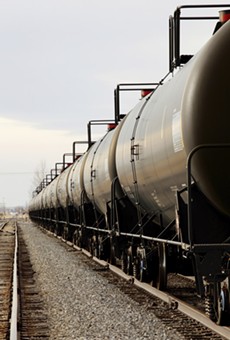News Blog
The no-win dilemma of oil trains and pipelines
New York certainly hasn't been immune to the oil train boom, particularly in Albany where a company's plan to enhance its crude oil transfer terminal has generated a lot of controversy. And the Rochester area, too, has crude oil-carrying trains coming through it (see "Rochester's crude awakening" in this week's edition of City).
This morning, the New York politics-heavy news site Capital published an article plainly headlined "Energy secretary: U.S. infrastructure unready for rail-crude boom." And because I knew that oil trains are rolling through Rochester, the article really grabbed my attention.
The publication landed an interview with US Energy Secretary Ernest Moniz, who has served in the job since May. The article quotes Moniz as saying that the number of oil train accidents is troubling and that the infrastructure for crude oil transport by train is lacking. But he also says pipelines are a better alternative, though the capacity doesn't exist to handle the Bakken Shale oil output. From the article:
This morning, the New York politics-heavy news site Capital published an article plainly headlined "Energy secretary: U.S. infrastructure unready for rail-crude boom." And because I knew that oil trains are rolling through Rochester, the article really grabbed my attention.
The publication landed an interview with US Energy Secretary Ernest Moniz, who has served in the job since May. The article quotes Moniz as saying that the number of oil train accidents is troubling and that the infrastructure for crude oil transport by train is lacking. But he also says pipelines are a better alternative, though the capacity doesn't exist to handle the Bakken Shale oil output. From the article:
“What we probably need is more of a pipeline infrastructure and to diminish the need for rail transport over time,” he said. “Frankly, I think pipeline transport overall probably has overall a better record in terms of cost, in terms of emissions and in terms of safety.”Moniz's statements in the article, give the impression that he supports increased pipeline development. And while more pipeline capacity may be get crude oil off the tracks, it still isn't going to sit well with folks who want the United States to move away from domestic fossil fuel extraction and who are fighting projects like the Keystone XL pipeline.
